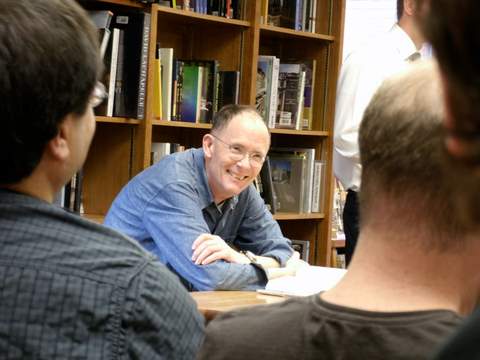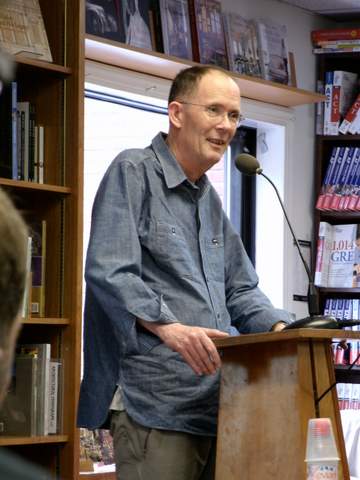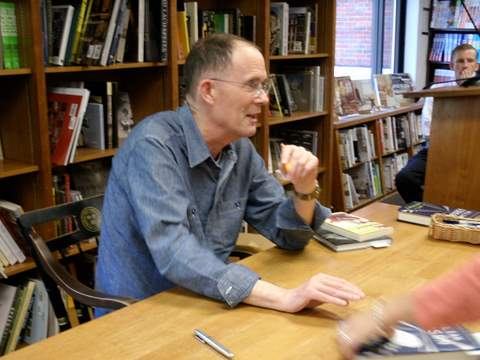|
Atomized Links:
Usual Suspects:
(A search engine for Wikipedia)

|
|
 |
Atomized junior

|
Wednesday, October 27, 2010
|
|
| |
Juan 'the lottery' Williams
The incident last week in which National Public Radio fired analyst Juan Williams caught me by surprise and had me puzzled at first. I have always enjoyed his observations on NPR's Morning Edition. I have no problem with correspondents showing up in various places other than their home employer. It allows for the possibility of a greater diversity of opinion on any given outlet, gives the hosts someone fresh to talk to, and gives the visitors a bit of extra income. There is an element of "when it Rome..." to all this, but that's to be expected. So it seemed at first that NPR had over-reacted and was going against the grain or spirit of this little game. Even as the history of NPR's concerns and discussions with Mr. Williams came to light, NPR's objections seemed overwrought. Journalists and commentators play different roles in different organizations. You are invited to somebody's table as foil or fulfillment, it's rarely less than obvious. My best guess, when Mr. Williams showed up on Fox within 24 hours with a multi-year $2 million contact in hand, is that Williams and Fox News had already made this deal and what occurred was little more than accomplishing the thing with maximum noise and public relations. The storm and fury one saw on this signified very little.
Even if this is not the case, I have only limited sympathy for Mr. Williams. On the day of the first interview he gave us a poorly worded, poorly thought out off-the-cuff comment: "But when I get on a plane, I got to tell you, if I see people who are in Muslim garb and I think, you know, they're identifying themselves first and foremost as Muslims, I get worried. I get nervous." A nod to his host Bill O'Reilly's sensibilities, but later in that same interview he offered some resistance to the proposition that Islam attacked us on 9/11 saying it was wrong to generalize in that way, Juan Williams at odds with NPR over dismissal. On the second day's interview, he doubling down on his comments. Repeatedly asserting they were OK because they were honest opinions (as though that covered it, I never doubted the Klan honestly disliked black people) and intimated they were popular opinions. I imagine they are, limited to Fox viewership and the Fox commentariat line. But that reeks monstrously of situational ethics.
The comment was frankly and starkly bigoted. A text book example of prejudice and the symbolic assailant, what can be called Identity Politics America's degraded public debate | Benton Foundation:. Especially the cloying between-the-lines assertion that the individuals Williams was describing were being aggressively in-your-face Muslim, in their public dress and manner, when it was in their place to tone that down so as not to offend or afear Mr. Williams or Mr. O'Reilly. Many suggested a simple substitution test on Mr. Williams observations: draw up a list of national religious and ethnic nomen and start running them into that statement. Try them out on your friends and associates, strangers in bars. See who breaks your nose first, because someone will. I, for my part, would be worried to see a well-dressed cuff-linked pundit or Wall street executive board a plane I was on. Men like these nearly cratered the world economy two years ago -- and failed through no grace or action of their own. They would have no problem flying a plane into the ground at 700 knots. And with no fear for themselves, because they all hold solid gold pearl-inlay parachutes.
Fox news is not a really news organization. It is a partisan editorial platform covered with the faintest fig leaf of denial. No one on Fox news is a journalist or should think of themselves as such. However in this incident NPR appeared crabby and thin skinned. NPR CEO Vivian Schiller's comment about Williams keeping this between himself and his psychiatrist was abysmally churlish. And it was a bad reaction Amid anger, regret over Williams's firing, NPR staffers fear financial backlash. I do not want NPR to be pushed and prodded around until they find themselves re-created as a straw man; labeled the progressive-democrat political network. That's Pacifica's job. NPR should consciously and actively try to to resist this, not letting themselves get boxed into a corner where they are used to justify Fox news.
11:53:47 PM  ;; ;;
|
|
|

|
Thursday, October 21, 2010
|
|
| |
Joseph Cao, deliberate congressman
The Washington Post Sunday Magazine featured an article on first term Republican Congressman Joseph Cao a couple of weeks ago Joseph Cao, the unlikely congressman from New Orleans. Cao is the first Vietnamese American elected to congress and represents Louisiana's 2nd congressional district (a section of the city of New Orleans). This post is aimed, as you might imagine, not at Washington Post readers from the dc area who would have read this at the time, but people from other parts. The article took the form of a positive human-interest story, but then I think it would hard to run an expose type story on this guy. There were two anecdotes from the article I especially liked. His less then completely successful stint as a divorce lawyer, he kept talking couples into staying together. And his Hari Kari quote directed against BP. I'll take that over Joe Barton's unholy sucking up to big money any day. While all this is in the article, I'll throw in a brief reiteration of salient points from his biography here. Joseph Cao is from Vietnam, born in Saigon 13 March 1967. He was sent to the U S as a child to live with relatives. He was separated from his sister, in the process, sent to live with different relatives. He graduated from Baylor as a physics major. Then there was a period as a Jesuit seminarian and work as a novice in Mexico. The Jesuits it seems sent him to graduate school at Fordham as a philosophy major. Somewhere along the line he had enough of an epiphany to propel him to law school at Loyola and then settle in New Orleans as an immigration lawyer with a focus on Louisiana's Vietnamese community and some time on the board of Boat People SOS (bpsos.org). He strikes me as a true catholic, and an actual compassionate conservative mostly a chimera elsewhere. Overall, a smart and determined man.
For all that he is a republican in a very democratic city. One that the democrats are loathe to let go of. Even for a good man November's election, prospects a less than likely return. Cao got elected on the back of reaction to William "cold-cash" Jefferson's malfeasance problems. He won that election mostly due the the Democratic party and community's inability to come to terms with Jefferson and gracefully position another candidate to replace him. When Jefferson didn't win, and shortly before he was sentenced to 13 years in jail, portions of the community ran a recall effort against Cao which went nowhere. A year on and he is well down in the polls now, against a popular young and likable opponent. Who has picked up the Presidents endorsement - in the form of TV ad Obama Cuts First General Election Ad For Cao Opponent Cedric Richmond | TPMDC. This last seems especially sad, and unfortunate, given that just a year ago President Obama invited Rep. Cao and his family to the White House to watch the New Orleans Saints in the Superbowl. The Democrats now desperately need every last possible seat in congress and reliable votes on every critical roll call. So business is business and the tap goes to Cedric Richmond.
Joseph Cao will land on his feet I'm sure, There is no particular joy in being a junior congressman unless you have your home ducks in a row. Political life probably has not seen the last of him in any regard. I would like to see him come out to the University of Maryland for a talk on his experiences over the past few years.  Route one and Cave Neck rd., Milton Delaware
The Libraries at UMCP used to sponsor a speaker series like that. I imagine they still do. There are a dozen or more speaker series on campus if not. It's something I'd like to see happen. It is a sign of the times, perhaps, but in today's political climate, warming and getting warmer. That unlike more name and face recognizable political figures - Joseph Anh Cao just doesn't bring the necessary level of crazy to the game.
11:34:16 PM  ;; ;;
|
|
|

|
Monday, October 11, 2010
|
|
| |
William Gibson at P + P
 William Gibson gets to know the crowd William Gibson gets to know the crowd
I saw author William Gibson at a book store signing supporting his new book Zero History. This book is the last of the "Bigend" trilogy, the third Gibson trilogy each of which takes place in a different possible meta space. The Sprawl and Bridge trilogies being the earlier two William Gibson - Wikipedia . The Washington DC stop was at the end of the US leg of the tour supporting the book, and he mentioned a couple of times that he would be glad to be back in Vancouver soon. The book signing took place at Politics and Prose book store. Where virtually every author-in-store event I've attended has been. If I need to buy a book, this is where I'll buy it. Not simply because it's a couple of blocks from my sister Ann's house. It is one of the best book stores I know of. Not the least because it began, grew, and built its reputation precisely at a time when the independent book store was disappearing in most places. It is with profound sorrow that I read of the passing of its founder and co-owner Carla Cohen: Carla Cohen dies; co-founder of D.C. bookstore Politics and Prose. They had announced they were putting the store up for sale in June. I hope still that someone will buy it and continue to run it as the exemplar it is. I only started reading Gibson about a year and a half ago. It was probably when the twenty-fifth anniversary of the publication of Neuromancer came around. I realized that not reading Gibson was a gap and set about acquiring an array of books to bridge that gap. Many years ago in middle and high school I read through Clarke, Asimov, Ellison, Disch, Vonnegut, and Aldiss (I still fondly recall books like Judith Merril's "England swings SF", but after Aldiss I left off reading science fiction returning briefly only to read through Stanislaw Lem. I never read any of the so-called cyperpunk writers of the 80's and 90's at the time.  Reading from Zero History Reading from Zero History
Gibson, after a read-through of a passage from Zero History offered to take questions from the fair sized audience. Many of the initial questions dealt with how he appeared able to describe the future world we are moving into so precisely. Prescient shades of which Nostrodamus predicted he would become jealous of. His short answer was that he wasn't, he doesn't. He describes the present, subsets of the present. Which can resemble the future as they progress outward. He had a sort of codification of this he termed "Science Fiction and the Patina of the Present " The obsolescence of any science fiction novel -- read as prognostication -- as soon as it's written. He referred to seeing the century of science fiction already published as a map of the past. In many cases an unintentional alternative past. My own version of such fanboy questions (which I didn't ask) would be to ask what sort of social milieu he was traveling in when he wrote his first stories and novels. I'm old enough to have a nostalgia, or something akin to one, for that pre world-wide-web (pre Internet dot.com expansion) tech-connect world, and the various types that inhabited it. Maybe another question would be how many people thought of "he took a duck to the face at 250 kts." when Capt. Ches. "You mean this isn't a Boeing 314?" Sullenberger set his plane down in the Hudson. It's hard to ferret that out now He took a duck in the face - Google Search. Gibson had an anecdote about the techie and entrepreneur wannnabe's who came up to him at various events and times back in the mid eighties (and presumably the nineties) with an eye on meeting him as a "lapel pin" of their ascent. "Googleability (Non-googleabilty of certain individuals that is) and the next television," he called it. There was a question from the audience on whether places or character predominate in his fiction. He answered this by pointing out that his "voice" (POV etc.) is limited to that of his chosen "unreliable" narrators presumably also by the chosen locale splinters and the potentiality of observation is frozen by those decisions. The conversation veered into a discussion of Cornell Boxes from All Tomorrows Parties, the last book in the previous trilogy. Cornell boxes are the art work of Joseph Cornell, midcentury American artist and musician. They are intricate though rough-unsophisticated shadowboxes of seeming found objects. The book's plot turned in part on perfect though imitation shadow boxes turning up. I missed how this part the discussion began. The implications of such a device would be commentary on art in the age of mechanical reproduction. Quality of the original object against copies filtered through Gibson's focus on our present culture's growing fetishization of the material object. An outgrowth of advertising and consumerism. The manufacturing paradox I think he called it. Post modern sublime was a phrase he used to describe the marketing of a very real "authentic" line of clothing, relating to a fictional character in a novel of his. Someone asked if he had a background in marketing. He indicated his formal training was in comparative literature, but accepted that his operating nexus was at the balancing point between the world of things and the quality of their irony. He mentioned he had met Naomi Klein and, while he did not think he could take her approach to things, believed they shared a mutual skepticism. There is a Washington Post interview article from the DC stop for his previous book tour which gives a good over-view on what he has been trying to accomplish with his recent novels: Through the Looking Glass,The Post-9/11 Era Has Caught Up With William Gibson's Vision . One of the subjects his recent writing is wrapped around is the idea that for our culture, the western-ish globalizing culture, the future is becoming harder to envision. I don't think this necessarily means that our efforts in science fiction, in popular-technological fulfillment-science writting, will be less accurate -- it could hardly be less so. No, the story here is that our magic eight-ball no matter how much we shake it, keeps telling us through its little window that "the future is cloudy." A particular glide path of transformations is rode out. Perhaps this phase is little more than post-war (WW dot two) optimism rounding back to neutral. All that ad astra enthuzema along it, and the next horizon not yet firmly in sight. But I wouldn't say 11 September 2001 formed any irrecontrovertable demarcation of possible futures. There wasn't anything about September 11th that wasn't in play for a decade and more. Not the groups, politics, religiosity, ideology or tactics. The difference was that it succeeded, and that we interpreted it as the new millennium's opening argument against us.  William Gibson signing books William Gibson signing books
The talk turned to genre fiction and how he is still seen as writing in a genre. As Gibson viewed it, he didn't think genre fiction had any inherent ability to limit a careful writer. It is merely organizing structure, a framework. Genre functions as a ready-made, a loose collection of settings attitudes and tropes the writer can do with what he or she will. A few weeks ago I came across a MetaFilter thread on the topic of genre fiction When Genre Zombies Attack! (while trying to determine whether MetaFilter had ever dealt with David Lindsay). That thread repeatedly made the point that all modern fiction is genre fiction. There is no serious no academic fiction, written by a wide and diverse enough body of writers not to fall into a handful of recognizable forms: genres. He made a comment semi seriously at the end of this about being engaged in a career-long arc to get to the same literary space that Margaret Atwood has gotten to. As the Q and A portion was winding down there was some talk about the Neuromancer movie. He said he had a better feeling about the current effort to bring about a Neuromancer movie than most previous ones. He admitted to sitting through meetings where he was secretly glad the necessary momentum did not seem to be in the room. Above all he cautioned until you see the words "green light" in published print, it's not really happening no matter what all else you read.
11:29:10 PM  ;; ;;
|
|
|

|
Tuesday, October 5, 2010
|
|
| |
30 Seconds over Westboro
About a year or so ago I encountered members of the Westboro Baptist Church currently the subject of a case being argued before the US Supreme court. It left a strong impression on me at the time. I thought I had notes on this, but I can't find them now. I came up on them one day while bicycling in to work. This was at the intersection of Adelphi rd., University Blvd., and Campus drive. An intersection governed by three sets of lights. The University of Maryland University College Conference center (Run by Marriott) lies to the eastern corner. There was a small group maybe 5-7 people protesting peacefully. They were outnumbered by the police and reporters Since they were on this normally deserted stretch of sidewalk. I had to thread my way through the whole group with my bike. It wasn't until I got this close and began reading their signs and handouts: God rejoices in dead soldiers, God hates this, God hates that. that I realized what sort of protest was going on. I recalled vaguely I had heard of this group before, but I couldn't recall much about them. I took note of the group's composition as I went through. There was one older flinty guy talking to someone who appeared to be a reporter in a quiet almost chatty tones. From pictures I saw later on I know this was the Rev. Phelps himself. In addition there were what appeared to be one or two couples holding signs and talking among themselves, possibly some younger children as well. There was one figure my attention was drawn to over all the others. A middle aged woman, late fifties, sixties hard to tell. She was just standing there holding a sign like the others but utterly set, utterly oblivious to her surroundings. Devoid of any emanation of human warmth. Her eyes shuttered iron doors admitting no feeling. She was -- unlike the rest.
When I got to my office some minutes later I was with the aid of a coworker able to come up with their name and go to their web site to see what they were protesting. It turned out to be a new defense department command's conference on developing solutions for the scourge of car-bombs and other types of improvised explosive devices (IED's) Joint IED Defeat Organization - JIEDDO. These annual conferences seem to take place in late October early November every year. This was probably 2008. The Westboro group was appalled by the very idea of stopping bombs, because they need blown apart men and women soldiers to theodrenically validate their own hatreds. I made the word theodrenically up, but I like it.
Oral arguments for Snyder v. Phelps [ Snyder v. Phelps, Docket No. 09-751 ] occurred today Wed., 06 Oct 2010. The case turns on one of the military funeral protests and is being argued on free speech grounds: Westboro Baptist Church case draws protesters at Supreme Court. It was originally decided for the plaintiff, but overturned on appeal and is now with the US Court Justices Hear Arguments in Funeral-Protest Case - NYTimes.com. There was already a long term set of interactions between the WBC and the authorities by the time of the incident in this case. Ground rules had been set, and were being adhered to (thousand foot offset for the protest, non (overtly) obstructionist behavior) Court considers anti-gay protests at funerals | Reuters. On a cursory examination it would appear to meet free speech requirements. No violence was being urged or incited. It is mere opinion; dramatically unpopular, offensive, but only opinion. The point of Free Speech is to extend protection of the law to minority opinion, almost by definition this will be unpopular opinion. The general public will eschew the protection afforded it almost as vehemently as the opinion itself. This cannot affect the law. At the same time there is a tendency of some, given to narrowly accepted opinion, to believe that the law affords them not only the right to speak an opinion, but freedom from disagreement, from counter-argument. It doesn't do that. There are some related considerations on the difference between private and public figures, and their private moments. The intimation is that free speech and personal subjective realm are a pair of inversely related dichotomies. That speech may be mediated as it impacts an individual's experience even if it isn't strictly slanderous speech. There isn't much that shouldn't be rejected about this on strictly free speech grounds. Libel laws cover false statements, public figures are open to a certain amount of exaggerated ridicule, private individuals are not. Anti-stalking and other criminal sanctions protect both public and private persona from violence and physical interference. At one point the lawyer for Albert Snyder, the plaintiff whose son's burial was interfered with, admitted that had this been a more straightforward and less perverse protest against the war but in otherwise similar circumstance, it would have easily fallen under more standard notions of protected political speech.
It doesn't seem right to leave it at that; though. So I want to add an additional thought. It's not just that these protests interfere with a private moment or even the presence of grief, of family suffering in these moments. Perhaps the key is the idea of an irreplaceable moment, a singular moment of grief. The Westboro Baptist Church people take that away, in their pursuit of their own hedonistic glory and nothing can replace it or give it back. What the court might consider is that all moments of a life are not alike, one coin from another carelessly fungible. That there are, with no doubt, unique passages within human experience.
11:01:37 PM  ;; ;;
|
|
|
|
|
|



